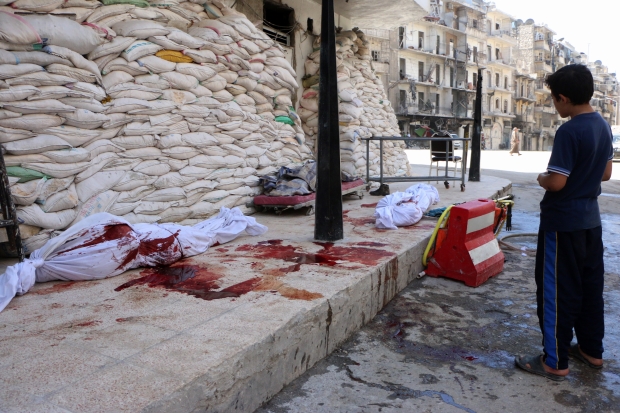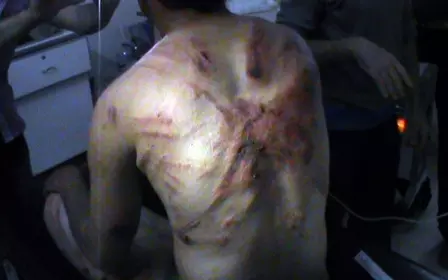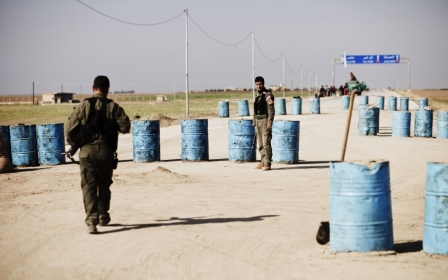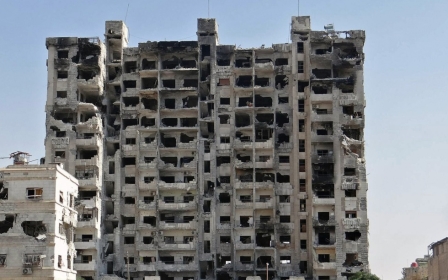Syria air raids kill 83, mostly civilians

Syrian air strikes against the northern Islamic State (IS) bastion of Raqa on Saturday killed 53 people, a monitor said, updating an earlier toll and adding that at least 31 of the dead were civilians.
"We have documented the deaths of 31 civilians, among them five women and three children, in Raqa and its surroundings," said Syrian Observatory for Human Rights director Rami Abdel Rahman.
Another 15 militants were confirmed dead in a string of eight air strikes, as well as seven other unidentified people.
Eight of the civilian victims were from one family, said Abdel Rahman.
The strikes come amid a stepped-up campaign by President Bashar al-Assad targeting IS positions in northern and eastern Syria.
Activists say such air raids often kill many civilians as well as militants.
Similar strikes on Tuesday in the eastern province of Deir Ezzor killed 16 people, including 10 children.
Meanwhile, President Francois Hollande on Friday said France was ready to join a coalition to counter IS militants while respecting international law, but would not commit to taking action in Syria.
Hollande said France would join a coalition called for by the United States but would not commit to actions in Syria "until we have sufficient evidence that what we do, or what we could do, will not advance Bashar al-Assad's cause".
In late August, Hollande had rejected any cooperation with Assad's forces.
"A big alliance is necessary but let's be clear - Bashar al-Assad cannot be a partner in the fight against terrorism, he is the de facto ally of jihadists," Hollande said.
France and other backers of the Syrian uprising against Assad have accused the government in Damascus of effectively backing the IS by failing to target it.
Damascus says it is fighting a war against "terror" and deems all those seeking to overthrow Assad "terrorists".
Assad barrel bombs 'hit taxi stand' in Syria's Aleppo
In a separate development, the Observatory raised its death toll from a Friday air strike targeting a Syrian rebel-held area of Aleppo city in the north to 15.
Syrian helicopters had dropped barrel bombs on a taxi stand in the city of Aleppo Friday.
An AFP journalist at the scene saw at least a dozen bloodied corpses lying on the ground. One, wrapped in a shroud, was apparently that of a child.
The journalist also saw several people on stretchers, showing burns and shrapnel wounds, and others lying in pools of blood near sandbags. It was not clear whether they were dead.
Haidariyeh is home to a popular taxi stand, and the AFP journalist said he saw numerous destroyed cars.
There was also a massive crater in the street left by one of the bombs.
One resident said: "I saw the bodies. They were workers, people who were simply trying to find a way to put bread on the table... You can see the human remains."
A man who had volunteered to help rescue survivors said "taxi drivers gather here to transport workers and goods... There were no rebels here."
In July, Human Rights Watch condemned the air force campaign, saying it had killed 1,700 people in five months.
Barrel bombs are typically constructed from large oil drums, gas cylinders or water tanks, filled with high explosives and scrap metal to enhance fragmentation.
Insurgent areas of Aleppo have come under massive aerial bombardment since December, killing hundreds of people and prompting tens of thousands to flee to safety.
The Syrian government has kept up its offensive despite a UN Security Council resolution in February condemning such strikes.
And east of Damascus, Syrian troops backed by Lebanese Hezbollah militants made fresh gains against rebel forces by taking the village of Hteitet Jarash, the Observatory said.
The village is near Mleiha, a former rebel bastion that fell to government control in mid-August after several months of fierce fighting and near-daily bombardment.
Hteitet Jarash is in the Eastern Ghouta area, which the army has besieged for more than a year.
Syria's war began in March 2011 as a peaceful protest movement demanding Assad's ouster, but morphed into a brutal war after pro-Assad forces unleashed a massive crackdown against dissent.
The United Nations says at least 191,000 people have been killed in the more than three-year conflict.
New MEE newsletter: Jerusalem Dispatch
Sign up to get the latest insights and analysis on Israel-Palestine, alongside Turkey Unpacked and other MEE newsletters
Middle East Eye delivers independent and unrivalled coverage and analysis of the Middle East, North Africa and beyond. To learn more about republishing this content and the associated fees, please fill out this form. More about MEE can be found here.





